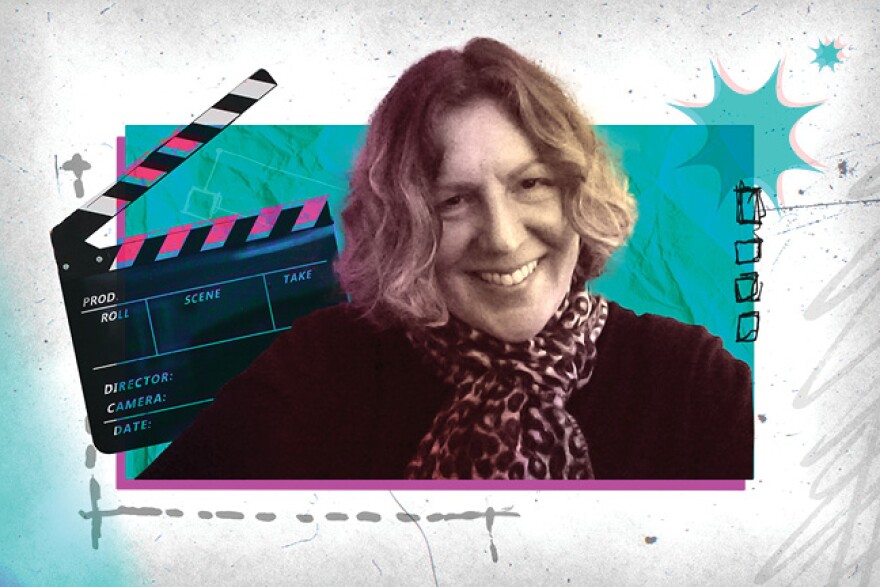In 2012, as head of physical production for Summit Entertainment, Andi Isaacs retired from Hollywood. With 30 years and many major projects, from Scent of a Woman to The Twilight Saga under her belt, she was ready “to fall in love with something else,” Isaacs says. She did film industry consulting, a lot of volunteering, and started an MS in counseling before finding that “something else”: teaching film to young adults. She says this age group “has my heart,” because “they’re struggling and need encouragement … (but also) they’re resilient and smart and have so much to offer.” Due to her particular expertise, Isaacs’ arrival at UNLV Film this school year represents a shift in the department’s academic approach. She sat down with Desert Companion in her movie paraphernalia-trimmed office recently to explain.
After a successful career as a film executive, why turn to teaching? And more specifically, why teach at UNLV?
I had been teaching just in the spring semesters at Florida State University, teaching film. And I said, ‘I'm really enjoying this.’ I met with some schools, and I loved UNLV … There's this wonderful combination of creative and critique and history and productions … I love the student population as well — very diverse. A lot of first-generation students, a lot of financial aid. They want to be here, there's no question at all. And I think that those are voices that should be really heard in Hollywood. So, it was very interesting to me.
What did you understand as your mission in UNLV Film?
Film schools are starting to change in a way that recognizes, yes, there's great creativity, but the film industry itself has changed a lot in the last 40 years, and you have to keep up with that. One of the things that film schools are starting to do is say, ‘We're going to help you get a job.’ This is not about graduating, going off to make a movie, and getting discovered, because it just doesn't work that way anymore. Festivals are not the same as they used to be, there isn't distribution like there used to be to get a job.
In a lot of film schools, you don't have people who did it for 30 years, retired, and started teaching. I knew I could bring that to the table: I'm going to help you get a job, I'm going to teach you the terminology that you use today, I'm going to really talk about the business. Because we all think of independent films, but pretty much 90 percent of everything out there was made by a studio. So, how could you exclude that 90 percent of work for the future of your students? UNLV embraced it.
I’m interested in that terminology you mentioned. Can you give me an example?
I teach the terms right off the bat, because even students don't know them. So, when you're talking about a “studio,” that means somebody that has funding and distribution, so they can get that (film) seen — whether it's somebody who has a deal with one of the major studios, or whether it's somebody like A24, who distributes their own films. And that's the most common way that films are made. If you have funding, but you don't have distribution, that's what an independent is. That basically means somebody has to pick you up, or nobody's going to see this film. And that's what festivals are for. Recently, most things going to festivals already had distribution, because the industry has become too risky. With streaming and video-on-demand and everything, nobody knows what's going to work. So, most things have funding and distribution deals before you ever make the film.
Interesting. What’s another term?
‘Production companies’ is what I call the mountain of mist. A production company doesn't make a movie or a TV show. The way we think about them, production companies are the ones here in Las Vegas making commercials and music videos and things like that. Production companies for film features and television are generally for liability … We created a (production) company for Twilight because you have to protect the mothership. But every single person who works on that movie is freelance, from the producer to the director to craft services … There’s no staff. It's not like there's a company that comes in and makes a movie.
Tell me about the classes you’re currently teaching at UNLV.
Right now, I teach three classes. Two of them are the Business of Hollywood … I teach how you take material and decide what's important. What storylines can you drop? What storylines do you need to keep? What characters can you drop? We talk a lot about public domain … and how accessible that is. We talk a lot about what a producer's role is, and how they find projects and how they pitch projects … So, it's about how you get a picture made, get funding, meet studio people. Where does the agency come in? How do you get actors attached? All of that.
The other class I teach is on producing. Very often, my projects will not be original stories. (So, I say to my students,) “Pick a movie from 1995, and that's the story you're going to pitch me,” because they have to learn the process. They have plenty of creative classes where they're writing, or they're coming up with their story, but they need to know the process from beginning to end. In my producing class right now, that’s a lot of it. It's about intellectual properties and adaptation.
How does this fit with your goal of helping graduates get jobs?
It's really about understanding how this business works and how you're going to make it work for you to find a career in it. We talk about unions and what they represent, and we even teach them handshaking and how to have an interview, networking, how to write an email, and all that stuff … In every other career, if you went to school, they'd teach you what the business you're going into is. So, if you want to be a doctor, you're going to have to learn about billing insurance, and all those other things. That's what this is (for film).
We also started a club called the Moving On Club, because we recognize that our students, if they really want to succeed in the entertainment industry, are going to have to leave Las Vegas. So, I'm teaching them about moving to New York or Atlanta or Los Angeles.
What would you say to someone who considers higher education institutions places for cultivating big ideas, not technical-vocational programs.
I am a huge, huge believer in liberal arts. College is so much more than the major you take. But we're talking about not even two classes out of their entire college load … So, (the students) are having a tremendous amount of creativity, a tremendous amount of critique and history. They're learning all the equipment, how to write, how to move the angle of the camera, and everything. But these two classes may make or break whether people do it or not. A high percentage of students leave the industry three years after graduation, because they've never been taught how to make opportunities for themselves … This is a strategy to help them succeed.









